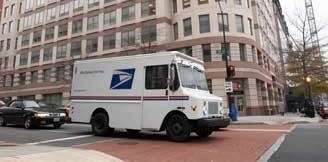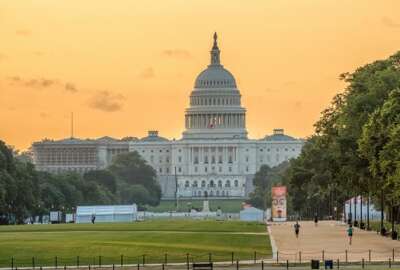
OMB’s Weichert: USPS employees see pay ‘rise faster’ than other feds
Lawmakers and Trump administration officials remain divided over whether rolling back postal unions’ right to collectively bargain over compensation, as...
Best listening experience is on Chrome, Firefox or Safari. Subscribe to Federal Drive’s daily audio interviews on Apple Podcasts or PodcastOne.
Lawmakers and Trump administration officials remain divided over whether rolling back postal unions’ right to collectively bargain over compensation, as recommended by the White House’s Postal Task Force, would put the agency on firmer financial footing.
Senate Homeland Security and Governmental Affairs Committee ranking member Gary Peters (D-Mich.) said at a hearing Tuesday that the proposed reduction in collective bargaining was not “addressing the most fundamental reason why we’re here.”
“Collective bargaining is certainly in my mind an essential tool, and one that works best when labor and management share the same goals,” Peters said. “I am not clear on how removing collective bargaining for compensation would help deliver quality services.”
Margaret Weichert, the deputy director for management at the Office of Management and Budget, also serving as acting Office of Personnel Managment director, told lawmakers that postal unions’ ability to collectively bargain for compensation marks a “core difference” from unions who represent federal employees on the General Schedule pay scale.
“What you can see empirically is the annual raises and the annual salary considerations under a collective bargaining situation such as what the Postal Service has, they rise faster than some of the other elements in government,” Weichert said.
However, David Williams, one of two current members on the USPS Board of Governors, said rolling back collective bargaining rights wouldn’t address the fundamental problem of the Postal Service’s business model.
“I can think of no way in which it would impact it at all,” Williams said.
According to the Postal Task Force report, the Postal Service has a higher cost-per-employee than private-sector shippers, but Williams disputed those figures.
“We’re working with them to try to overcome very, very different outcomes,” he said. “Something’s wrong with the numbers.”
Career postal employees, Williams said, start out at $17 an hour. By comparison, employees at private-sector competitors receive a $20 starting hourly wage and earn pay raises faster than USPS employees, he said.
Gary Grippo, the Treasury Department’s deputy assistant secretary for public finance, projected the Postal Service would run out of cash to pay its employees and contractors within “two-to-three years” without a significant change to its business model.
“Obviously, this is not a financially viable entity in the long-term or even the short-term. Something has to be done, and we’ve been kicking this can down the road for quite some time,” said Sen. Ron Johnson (R-Wis.), the committee’s chairman.
To avoid a taxpayer-funded bailout of the Postal Service, Grippo said the task force grounded its recommendations in three principles:
- The Postal Service should “continue as a government entity”
- USPS “requires a fundamentally new business model”
- Postal reform shouldn’t “shift costs or risks” to the taxpayer or the Treasury.
However, Grippo also clarified that the task doesn’t recommend closing post offices, reducing service in rural parts of the United States or charging more for delivery in rural areas.
“The task force strongly believes that any potential solution should not disadvantage rural or remote locations,” Grippo said, calling the Postal Service delivery’s network to every address “a national asset and part of our nation’s critical infrastructure.”
Sen. Tom Carper (D-Del.) said the task force report fell short of conducting the “data-driven analysis that would be required” to provide sound recommendations to overhaul the USPS business model.
Related Stories

USPS posts $1.5B loss, despite boost from holiday, midterm election mail
Instead, Carper urged Congress to pass a bill that would give USPS the “breathing room” it would need to reform its business model. Most postal reform bills in recent years would require postal retirees to enroll in Medicare Part B in order to reduce the burden of a 2006 mandate to pre-fund health benefits for future postal retirees.
However, Weichert said the administration opposed the idea, saying that the Postal Service should continue to maintain itself “as a fully funded capability.”
Williams said the USPS pension fund holds $335 billion, but can only invest low-risk, low-reward Treasury bonds which yield about a 2 percent return – a fraction of what an investment in the stock market would yield.
“I don’t think there’s a person in this room that wouldn’t fire a fund manager that said 2 percent was all they could do,” Williams said. “They’d be out the door.”
Robert Taub, the chairman of the Postal Regulatory Commission, said the “single-most” important legislative fix would be for Congress to better define the USPS universal service obligation.
”Only by defining the USO clearly can we begin to design a system that will fund the services required,” Taub said. “It is our nation’s mission statement for the Postal Service, and it needs to be clear.”
Copyright © 2025 Federal News Network. All rights reserved. This website is not intended for users located within the European Economic Area.
Jory Heckman is a reporter at Federal News Network covering U.S. Postal Service, IRS, big data and technology issues.
Follow @jheckmanWFED




